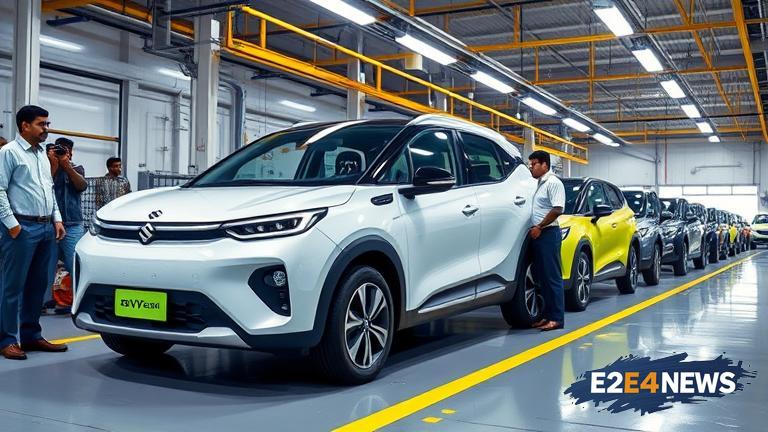In a major boost to India’s electric vehicle (EV) sector, Prime Minister Narendra Modi inaugurated Maruti Suzuki’s new EV plant in Gujarat. The plant, which is expected to play a crucial role in the company’s plans to launch a range of EVs in the country, is a significant milestone in India’s journey towards becoming a major EV manufacturing hub. The new plant is located in the Hansalpur village of Ahmedabad district and has been set up with an investment of over Rs 10,000 crore. The plant will have a production capacity of 2.5 lakh units per annum and will create over 1,000 jobs. The inauguration of the plant is a testament to the government’s efforts to promote the adoption of EVs in the country. The government has set a target of having at least 30% of new vehicle sales as electric by 2030. Maruti Suzuki, which is the largest car manufacturer in India, has been working towards launching a range of EVs in the country. The company has already launched the e-Vitara, which is a compact SUV that is expected to be a game-changer in the EV segment. The e-Vitara is powered by a 60kWh battery pack and has a range of over 500 km on a single charge. The vehicle is expected to be priced competitively and will be available in several variants. The launch of the e-Vitara is expected to give a major boost to the EV sector in India, which has been growing rapidly in recent years. The government has been providing several incentives to promote the adoption of EVs, including subsidies and tax exemptions. The FAME II scheme, which was launched in 2019, provides subsidies to buyers of EVs and has been instrumental in promoting the adoption of EVs in the country. The scheme has been extended till 2025 and is expected to play a crucial role in achieving the government’s target of having at least 30% of new vehicle sales as electric by 2030. The inauguration of the new EV plant by Maruti Suzuki is a significant milestone in India’s journey towards becoming a major EV manufacturing hub. The plant is expected to play a crucial role in the company’s plans to launch a range of EVs in the country and will help to promote the adoption of EVs in India. The plant will also help to create jobs and stimulate economic growth in the region. The government has been working towards creating a favorable ecosystem for the growth of the EV sector in India. The Ministry of Heavy Industries has been working towards creating a comprehensive policy framework for the EV sector, which includes incentives for buyers and manufacturers of EVs. The government has also been working towards creating a network of charging stations across the country, which will help to promote the adoption of EVs. The inauguration of the new EV plant by Maruti Suzuki is a significant milestone in India’s journey towards becoming a major EV manufacturing hub. The plant is expected to play a crucial role in the company’s plans to launch a range of EVs in the country and will help to promote the adoption of EVs in India. The plant will also help to create jobs and stimulate economic growth in the region. The launch of the e-Vitara is expected to give a major boost to the EV sector in India, which has been growing rapidly in recent years. The government has been providing several incentives to promote the adoption of EVs, including subsidies and tax exemptions. The FAME II scheme, which was launched in 2019, provides subsidies to buyers of EVs and has been instrumental in promoting the adoption of EVs in the country. The scheme has been extended till 2025 and is expected to play a crucial role in achieving the government’s target of having at least 30% of new vehicle sales as electric by 2030. The inauguration of the new EV plant by Maruti Suzuki is a significant milestone in India’s journey towards becoming a major EV manufacturing hub. The plant is expected to play a crucial role in the company’s plans to launch a range of EVs in the country and will help to promote the adoption of EVs in India. The plant will also help to create jobs and stimulate economic growth in the region. The government has been working towards creating a favorable ecosystem for the growth of the EV sector in India. The Ministry of Heavy Industries has been working towards creating a comprehensive policy framework for the EV sector, which includes incentives for buyers and manufacturers of EVs. The government has also been working towards creating a network of charging stations across the country, which will help to promote the adoption of EVs. The inauguration of the new EV plant by Maruti Suzuki is a significant milestone in India’s journey towards becoming a major EV manufacturing hub. The plant is expected to play a crucial role in the company’s plans to launch a range of EVs in the country and will help to promote the adoption of EVs in India. The plant will also help to create jobs and stimulate economic growth in the region. The launch of the e-Vitara is expected to give a major boost to the EV sector in India, which has been growing rapidly in recent years. The government has been providing several incentives to promote the adoption of EVs, including subsidies and tax exemptions. The FAME II scheme, which was launched in 2019, provides subsidies to buyers of EVs and has been instrumental in promoting the adoption of EVs in the country. The scheme has been extended till 2025 and is expected to play a crucial role in achieving the government’s target of having at least 30% of new vehicle sales as electric by 2030.
